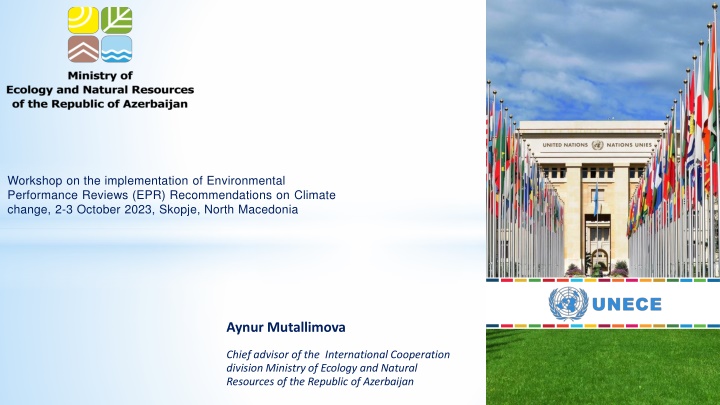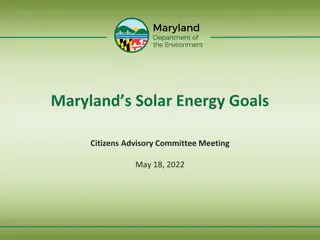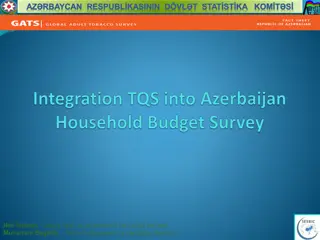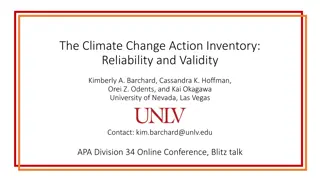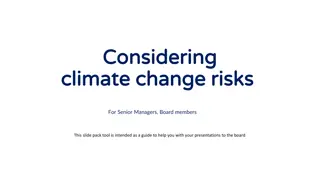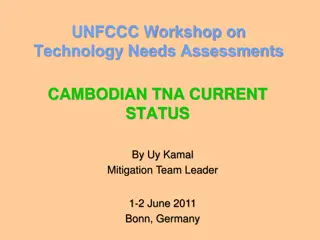Workshop on Environmental Performance Reviews: Addressing Climate Change in Azerbaijan
This workshop focuses on the implementation of Environmental Performance Reviews (EPR) recommendations on climate change in Azerbaijan. It highlights Azerbaijan's efforts to mitigate global climate change effects through international agreements, targets for reducing greenhouse gas emissions, vulnerability in water resources, agriculture, and coastal areas, measures taken such as submitting NDCs and establishing state commissions, and state programs for clean environment and green growth.
Download Presentation

Please find below an Image/Link to download the presentation.
The content on the website is provided AS IS for your information and personal use only. It may not be sold, licensed, or shared on other websites without obtaining consent from the author.If you encounter any issues during the download, it is possible that the publisher has removed the file from their server.
You are allowed to download the files provided on this website for personal or commercial use, subject to the condition that they are used lawfully. All files are the property of their respective owners.
The content on the website is provided AS IS for your information and personal use only. It may not be sold, licensed, or shared on other websites without obtaining consent from the author.
E N D
Presentation Transcript
Workshop on the implementation of Environmental Performance Reviews (EPR) Recommendations on Climate change, 2-3 October 2023, Skopje, North Macedonia Aynur Mutallimova Chief advisor of the International Cooperation division Ministryof Ecology and Natural Resources of the Republic of Azerbaijan
Azerbaijans Climate Change Country Profile and Targets Azerbaijan joined the international efforts to mitigate the negative effects of global climate change by ratifying the UN Framework Convention on Climate Change in 1995, the Kyoto Protocol to the Convention in 2000, and the Paris Agreement in 2016. Azerbaijan contributes only 0.15% of total global GHG emissions, with around 5.5 tons of CO2 equivalent emissions per capita. Energy and agriculture are two sectors with the largest GHG emission shares, respectively 70% and 13 %. Increase electricity production from renewable energy sources with share up to 30% by 2030. Create net zero emission zone in Karabakh and Eastern Zangazur regions by 2050 35% reduction in the level of GHG emissions compared to 1990 by 2030 Reduce greenhouse gases by 40% by 2050 Azerbaijan joined the Bonn Challenge with the commitment of bringing 270 thousand hectares forest land into restoration by 2030
Vulnerability Water resources Agriculture Coastal areas The water flow of major rivers and the level of Caspian Sea are already decreasing. As a result of climate change, our water resources have decreased by 15% over recent decades.
Measures Taken Azerbaijan submitted its First Nationally Determined Contribution (NDC) in 2017 to the UNFCCC secretariat; The updated (Second) NDC is ready and soon will be submitted to the UNFCCC secretariat Fourth national communication to the united nations framework convention on climate change submitted in 2021 - https://unfccc.int/sites/default/files/resource/FNC%20report.pdf State Commission established in 1997 to ensure implementation of the obligations under UNFCCC was approved in a new composition on March 11, 2020 by the Order of the President of the Republic of Azerbaijan. Working group on climate change with representatives of each member organization of abovementioned Commission been established. The first "smart village" project based on modern technologies in Azerbaijan was implemented in Zangilan district of Eastern Zangazur region. In "smart villages", the energy needs of residents is met only at the expense of alternative energy sources, which will contribute to the measures aimed to reduce the impact of climate change.
State Programs, legislations and action plans "Azerbaijan 2030: National priorities for socio-economic development" Priority 5 Clean environment and Green growth aapplication of green and smart technologies to reduce GHG; "Strategy of socio-economic development of the Republic of Azerbaijan in 2022 2026" Action plan - development of inventory of greenhouse gases and Monitoring-measurement, accountability and verification (MRV) system, creation of an institutional base based on modern experience of the MRV system and creation of a national database based on international experience; The State Strategy on the use of alternative and renewable energy sources in the Republic of Azerbaijan- defines the areas for the production of electricity and heat through the wide use of alternative and renewable energy sources; I State Program for the Great Return to Karabakh - will result in an increase in the absorption potential of greenhouse gases to achieve the goals of the updated Nationally Determined Contributions document by increasing forest and green areas; The draft of the Law "On the Management of Greenhouse Gases Released into the Atmosphere" has been prepared by MENR and it was sent for the revision of the other related state organizations.
Mitigation measures At present, large-scale projects in the field of electricity generation from solar and wind energy have been launched by ACWA Power of Saudi Arabia and Masdar of the United Arab Emirates. As a result of these projects, its estimated to reduce approximately 2% of total greenhouse gas emissions of the country in the field of electricity production. Low Emission Development Strategy is under preparation. Implementation of this strategy in future will lead to mitigation actions in all sectors. Bonn Challenge with the commitment of bringing 270 thousand hectares forestland into restoration by 2030. Besides this initiative, the greening activities such as the establishment of modern agro-forest massifs are being implemented all over year in the country. As aresult of modernization of the gas distribution system implemented by "Azerigas" Production Union in 2015-2018, the emission volume of methane gas (CH4) decreased by 6 693.52 thousand tons with CO2 equivalent.
Adaptation measures Doppler air radars have been installed and put into operation in Goy-gol and Shamakhi regions; 40 modern automatic hydrological stations have been installed in order to observe and detect hydrometeorological processes. National Adaptation Plan for Azerbaijan is under development. The plan will cover three sectors highly sensitive to adverse impacts of climate change, namely agriculture, coastal zones and water resources.
Compared to the figure of 1990, the downward trend in emission level has decreased since 2000 and changed from 46.54% to 31.59% by 2016 (last inventory year)
Challenges *Lack of Technological Capacity: Building the technological capacity for clean energy production, efficient transportation, and sustainable agriculture can be a hurdle. This includes access to the latest technologies and expertise needed for effective climate action. *Data and Information Gaps: Adequate data and information are essential for informed decision-making. There is gaps in climate data, which can hinder the ability to assess vulnerabilities and plan adaptation strategies effectively. *Institutional Capacity: Building the institutional capacity to develop, implement, and enforce climate policies and regulations are important. Effective governance and coordination among relevant agencies are essential. *Social Awareness and Behavior Change: Raising public awareness about climate change and promoting sustainable practices is essential. Behavior change is necessary at both the individual and community levels to reduce emissions and adapt to changing climate conditions. *Water Scarcity: Azerbaijan faces water scarcity challenges, and climate change can exacerbate this issue. Managing water resources and ensuring access to clean water for both consumption and agriculture are critical for adaptation efforts. *Vulnerability to Climate Change Impacts: Azerbaijan is vulnerable to various climate change impacts, including increased temperatures, extreme weather events, and sea-level fluctuations. Adaptation measures should address these vulnerabilities.
Environmental Performance Review of Azerbaijan EPR 2 recommendations on climate issues Accomplishments Recommendation 4.2 At the time of the second EPR, Azerbaijan had not developed a climate change strategy for mitigation of greenhouse gas emissions or adaptation to climate change.(Chapter 4) National Adaptation Plan for Azerbaijan is under development. The plan will cover three sectors highly sensitive to adverse impacts of climate change, namely agriculture, coastal zones and water resources. In addition law on is under development. In addition climate action plan been prepared within The State Commission on Climate Change . Recommendation 4.3: In cooperation with relevant stakeholders, the Ministry of Ecology and Natural Resources should: (a) Develop the second National Communication to the United Nations Framework Convention on Climate Change; (Chapter 4) Fourth national communication to the united nations framework convention on climate change in 2021 The State Commission on Climate Change has existed since 1997; however, it has not been active since its creation (Chapter 4). New composition of Commission approved on March 11, 2020 by the Order of the President of the Republic of Azerbaijan. Working group on climate change with representatives of each member organization of abovementioned Commission been established, climate action plan been prepared. There is no State Commission on Sustainable Development. Sustainable development issues are discussed at the Cabinet of Ministers. Although discussions at this high level may bring visibility, especially during the Year of the Environment, there is also a risk that in subsequent years, sustainable development issues may become less of a priority for Government or that more powerful ministries may gain more leverage. (Chapter 1) Azerbaijan has prioritized 17 Sustainable Development Goals (SDGs) (88 targets, and 119 indicators )including climate change. In 2016, the President of the Republic of Azerbaijan issued a decree to establish the National Coordination Council for Sustainable Development for the full implementation of its obligations under the UN 2030 agenda. As a result of the actions taken, Azerbaijan was ranked 50th among 163 countries in the UN Sustainable Development Report for 2022, achieving 73.5 points out of 100 for the Sustainable Development Goals Index .
3rd EPR of Azerbaijan On 15-23th November international team of experts led by UNECE carried out 3rd EPR in Azerbaijan to analyze progress made since 2011. On 14-15th September, in Georgia, Tbilisi delegation of Azerbaijan and international experts met to finalize draft recommendations for the 3rd EPR of Azerbaijan. The EPR recommendations adopted by UNECE Committee on Environmental Policy on 5th of October in Nicosia will support Azerbaijan in further improving its Environmental performance, policy-making, and implementation of the activities.
The 28th session of the Conference of the Parties (COP28) of the UN Framework Convention on Climate Change (UNFCCC) Dubai, United Arab Emirates. COP28 is expected to be attended by about 100 heads of state and government, as well as over 50,000 delegates. The key topics of the Conference is climate finance, climate action and just transition Azerbaijan will set up its country pavilion with a total area of 254 m 2 in Cop 28 in Blue zone of the Dubai Expo Center The side events of various interested local, regional and international organizations are also planned to be held in the country pavilion, along with the display of virtual exhibits that reflect the work done by our country in the fight against climate change, mitigation and adaptation measures. About 20 applications have already been received to hold a side event in our pavilion.
Thank you! aynur.aliyeva@eco.gov.az
